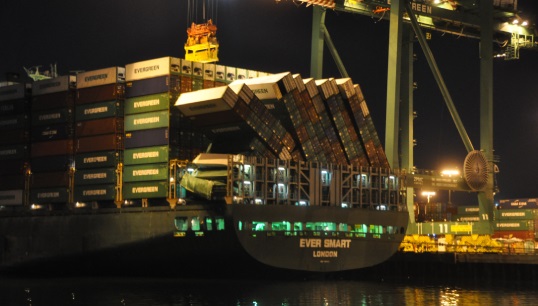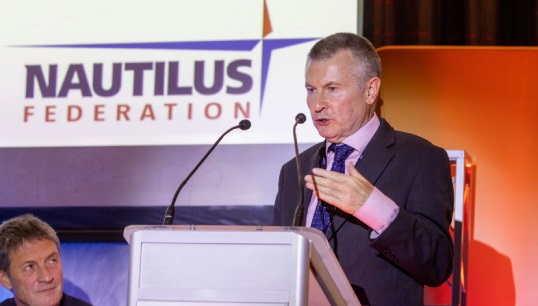
Maritime unions are pushing for a new social contract for seafarers, putting crew safety and wellbeing at the heart of global shipping. Many argue that 'best practice' should become the norm, not an added extra, but what exactly would this look like, and how can we keep standards high under the most testing conditions? Sarah Robinson reports
Shipboard accidents are every seafarer's nightmare. Far from shore, there's no one apart from you and your crewmates to tackle a shipboard fire, and you also have to be prepared for any incident that puts lives in danger, from a container stack collapse to a major ingress of water.
Even if everyone has stayed safe and well during an incident, you'll be aware that the situation could have put your career in jeopardy, especially if you are a master or senior officer. However, if your company handles things the right way and you take advantage of Union support, things don't have to deteriorate into criminalisation.
Best practice in preparing for emergencies
So what should your company be doing when things go wrong? There are some good examples to follow, according to Jacob Damgaard of Britannia P&I Club.
As an insurance company, Britannia P&I covers third party liability claims to shipowners, but it also advises on loss prevention and incident management. 'We advise our member companies to prepare well in advance of any incident by having an emergency response team of senior people,' Mr Damgaard explains. 'Crisis management training should be provided, and it should be clear who has the authority to take the necessary decisions during an emergency, such as signing off on a salvor.
We can help members understand which kind of organisation they are talking to in an investigation, and whether that body can bring criminal prosecutions Charles Boyle, Nautilus International
'Everyone involved – at sea and ashore – should know who does what in an emergency. Communication skills should be considered, and be supported by proper training. The emergency response team should plan ahead by considering different scenarios and carrying out drills accordingly.'
A former marine officer himself, Mr Damgaard knows what it's like to be on the shipboard side of an emergency. He points out how important it is for companies to have in place robust contingency plans to support the crew so they can focus on dealing with the onboard aspects of the incident. Part of this preparation is for the shore office to be ready to handle the media or maritime authorities, so that this pressure is taken off the crew.
Another aspect of good practice is to hold a debrief after the emergency is over, and it's important to listen to everyone involved in the incident – including the seafarers – so that lessons are learned, says Mr Damgaard.
'We do a lot of training for shipping companies on learning from what went wrong in the past, and we highlight the necessity of shoreside support when safety-critical decisions are required, such as restow of containers that haven't been loaded correctly. This may take time and come with a cost, but it's better than having a container stack collapse.'
What you should expect from your employer
For Nautilus director of legal services Charles Boyle, good practice means that a company should have a 'just culture'. This means that an employer is open to workers reporting mistakes without being penalised, so that safety lessons can be implemented. The opposite of this is a situation where workers are disciplined or criminalised, and become scapegoats for wider failings in a company. 'Employers should not be too quick to judge, and they should prioritise supporting their own employees,' he says.
Companies should also encourage employees to access the support that unions can offer members in an emergency, including having witnesses present in interviews.


Call Nautilus before speaking to investigators
Nautilus is always ready to help members affected by a maritime incident, Mr Boyle stresses. 'Please call us before anyone else: either contact your national branch or use the Nautilus 24/7 service if it's outside European office hours.'
The Union has long experience of representing members who are being questioned about an incident, and can help untangle the mess of different authorities with a stake in a case (possibly including the flag state, the state in whose waters the incident took place, the state where the vessel is owned, and the states where the seafarers are from).
'We can also help members understand who they are talking to, and what different bodies do. For example, you may be asked to speak to an investigative body equivalent to the UK Marine Accident Investigation Branch (MAIB), which seeks to find out what happened and make safety recommendations, but not to allocate blame. Or you might find yourself dealing with the equivalent of the UK Maritime & Coastguard Agency (MCA), which can bring criminal prosecutions.
'Then there are the P&I Clubs, who are not necessarily there to give you a hard time, but you should not forget that they answer to your employer. We would urge you to call us first, whoever you are being asked to speak to.'
JASON: supporting members under threat of criminalisation
Nautilus International works closely with other affiliate unions of the Nautilus Federation to combat the criminalisation of seafarers.
Members of Nautilus Federation unions have access to the Joint Assistance and Support Network (JASON), supported by Nautilus 24/7, our round-the-clock multilingual helpline.
Through JASON, the Nautilus Federation facilitates mutual assistance and support for seafarers who are members of a Federation union. So if you are involved in an incident in a country where the local union is part of JASON, that union can help with choosing a local expert lawyer and guidance on local investigation and legal procedures.
Support may also involve access to translation services and consular services, and the local union will be able to liaise with your own union, so that it can optimise the support it can extend to you.
You may not even need to be physically in the country in question, as JASON support applies to those involved in an incident within a port, territory, territorial waters or onboard a vessel flagged in one of the countries covered by the agreement.
In addition to JASON, the Federation has produced a guide on the joint IMO/ILO Guidelines on Fair Treatment of Seafarers in the Event of a Maritime Accident, detailing what maritime professionals can expect in terms of support and assistance if they are unfortunate enough to be involved in a maritime incident.
Alongside this is the Nautilus Federation Fair Treatment Checklist for maritime professionals to quickly remind themselves about their rights and how they can get advice and assistance if they become involved in a maritime incident.
Tags
More articles
Nautilus speaks out for seafarer safety at major IMO/ILO conference
Nautilus general secretary Mark Dickinson has called on governments, shipowners and maritime unions to form a 'coalition of the willing' to learn the lessons of Covid-19 and deliver a new social contract for seafarers
